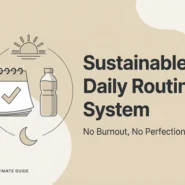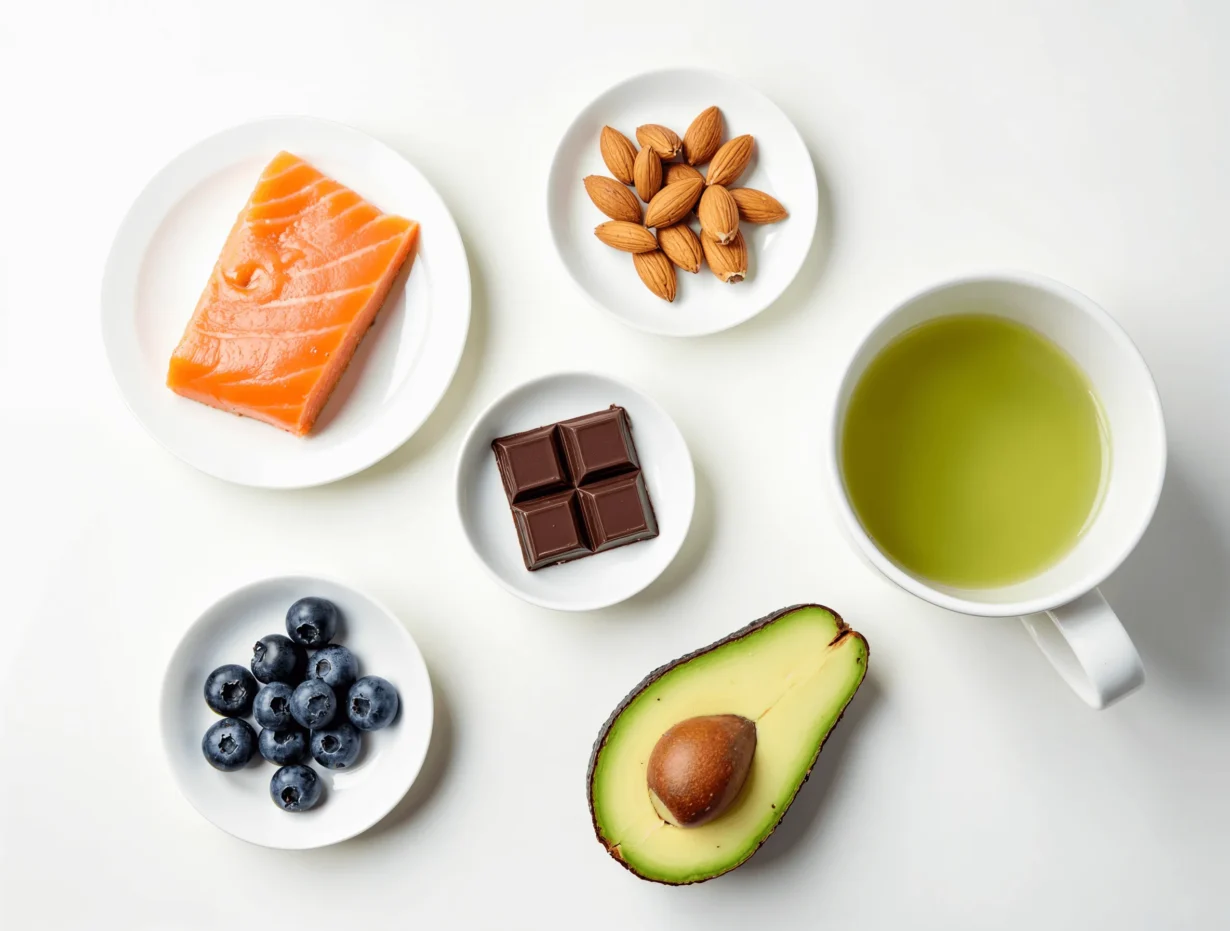We’ve all been there – deadlines piling up, notifications buzzing, and that familiar tension creeping into your shoulders. Stress has become our unwelcome companion in this fast-paced world. But what if I told you that your kitchen might hold the secret to keeping calm? That’s right! Emerging research reveals that specific dietary patterns and stress relief foods can actually lower cortisol (your primary stress hormone) levels by up to 25% while boosting those feel-good brain chemicals.
This isn’t about quick fixes or strict diets – it’s about strategic eating that transforms your stress response, one delicious bite at a time. Let’s dive into how your fork can become your most powerful tool against stress, exploring the best foods for stress and how nutrition and stress are intricately linked!
🧠 The Science Behind Stress and Nutrition
When stress hits, your body undergoes a series of changes – cortisol levels spike, blood sugar fluctuates, and your body actually depletes essential nutrients. It’s like your internal engine running on overdrive, burning through resources faster than normal.
Think of stress as a thief that steals your nutritional reserves. When you’re stressed, your body:
- Releases cortisol that can affect appetite and metabolism
- Often craves sugary, processed foods that worsen the cycle
- Decreases its ability to absorb and utilize nutrients
- Creates inflammation that further taxes your system and weakens your immune system
But here’s the good news – the right stress-reducing foods can interrupt this cycle, providing your body with the exact tools it needs to fight back against stress.
🥑 Build Your Foundation with Whole Foods
The first cornerstone of any stress-busting diet is emphasizing whole, natural foods while minimizing processed ones. Those convenient packaged snacks might give you a momentary boost, but they inevitably lead to crashes that can worsen your mood and stress levels.
What to Include:
Non-starchy vegetables: Dark leafy greens like spinach and kale pack a powerful punch of magnesium – often called the “relaxation mineral” because it helps regulate cortisol and activate calming GABA receptors in your brain. Think of it as nutritional yoga for your nervous system!
Whole grains: Oats, quinoa, and brown rice provide complex carbohydrates that stabilize blood sugar and promote serotonin production – your body’s natural feel-good chemical. Unlike simple carbs that cause blood sugar spikes (and subsequent crashes), these complex carbs provide steady, sustained energy.
Lean proteins: Chicken, turkey, fish, eggs, and plant proteins like lentils repair your body during stressful periods and provide tryptophan – an amino acid that helps create serotonin, which regulates mood and reduces stress.
Pro Tip: Aim for at least 5 servings of vegetables daily to ensure you’re getting enough stress-fighting vitamins and minerals. A simple way to achieve this is adding an extra vegetable to each meal, even breakfast!
🍳 Start Your Day Right: Stress-Free Breakfasts
That sugary pastry grab-and-go routine? It’s setting you up for a stress disaster. Blood sugar spikes lead to crashes, leaving you irritable and more vulnerable to stress. A balanced breakfast sets the tone for a calmer day by stabilizing blood sugar and providing sustained energy. Here are some stress-busting breakfasts to try:
Stress-Busting Breakfast Ideas:
- Scrambled eggs with avocado on whole-grain toast: This powerful combination delivers protein, healthy fats, and fiber that keep you satisfied while supporting brain health.
- Greek yogurt parfait with blueberries, almonds and honey: This breakfast powerhouse combines probiotics (which support gut health – where 80% of your serotonin is produced!), antioxidants, and mood-stabilizing nutrients.
- Spinach and feta omelet with whole-grain toast: The magnesium in spinach and protein from eggs create a perfect stress-fighting duo.
🥜 Snack Strategically Throughout the Day
Stress often triggers mindless munching – usually on chips, candy, or other processed foods that offer temporary comfort but worsen stress long-term. Instead, choose snacks that actually nourish your body while satisfying cravings. Let’s explore what foods help with stress when it comes to snacking:
Top Stress-Reducing Snacks:
- Almonds and walnuts: These nutritional powerhouses are loaded with vitamin E, B vitamins, magnesium, and omega-3 fatty acids – all key nutrients that help your body handle stress more effectively.
- Dark chocolate (70% cacao or higher): Contains flavonoids that reduce cortisol levels while giving you a mood boost. Just a small square can satisfy sweet cravings while actually benefiting your stress response.
- Apple slices with almond butter: The fiber, healthy fats, and touch of sweetness make this the perfect balanced snack to stabilize blood sugar and mood.
- Carrot sticks with hummus: This crunchy combo delivers satisfying texture plus fiber and healthy plant protein.
💧 Hydration Matters: The Liquid Component of Stress Management
What you drink is just as important as what you eat when it comes to stress management. Dehydration can actually amplify stress symptoms like headaches, fatigue, and difficulty concentrating. Let’s explore some soothing foods in liquid form and foods that relax you:
Best Beverages for Stress Relief:
- Green tea: Contains L-theanine, an amino acid that promotes relaxation without causing drowsiness – the perfect alert calmness.
- Black tea: Studies show it helps lower cortisol levels after stressful events. One study found people who drank black tea four times daily for six weeks had lower stress hormone levels and reported feeling more relaxed.
- Herbal tea: Chamomile, lavender, and passionflower teas are known for their calming properties and can be excellent additions to your stress-relief routine.
- Infused water: Add cucumber, lemon, or berries for a refreshing twist that makes hydration more enjoyable.
- Tart cherry juice: Provides natural melatonin, improving sleep quality by up to 90 minutes nightly. Better sleep equals better stress management!
What to Avoid: Limit caffeine intake to 400mg daily (about 4 cups of coffee). While your morning brew isn’t forbidden, excessive caffeine keeps your nervous system in fight-or-flight mode, counteracting all your other stress-management efforts.
🐟 Powerful Stress-Busting Superfoods
Some foods are true nutritional goldmines for combating stress. Their unique nutrient profiles target specific stress pathways in the body, making them especially effective additions to your diet. Let’s explore some of the top 10 foods for mental health and stress relief:
Top Stress-Fighting Superfoods:
Fatty fish (salmon, mackerel, sardines): Rich in omega-3 fatty acids that reduce inflammation linked to anxiety and stress. These healthy fats also boost BDNF – a protein that helps neurons handle stress more effectively. Studies show regular omega-3 consumption can decrease anxiety symptoms by 20% in just 12 weeks!
Avocados: Packed with potassium, B vitamins, and healthy fats that support neurotransmitter function and blood pressure regulation. Think of avocados as nature’s stress-management fruit!
Blueberries: These tiny fruits pack a powerful antioxidant punch that combats oxidative stress – a physical stress that damages cells. Their vitamin C content also helps regulate cortisol production.
Turmeric: Contains curcumin, which has impressive anti-inflammatory properties that help mitigate the physical effects of chronic stress on your body.
Citrus fruits: Loaded with vitamin C, which acts like a biochemical bodyguard – neutralizing free radicals while supporting adrenal function during stressful times.
Pistachios: These nuts are not only delicious but also rich in protein, healthy fats, and antioxidants that can help reduce blood pressure and heart rate during stressful situations.
⏰ Meal Timing & Mindful Eating Practices
Even the healthiest foods won’t fully help if you’re eating erratically or mindlessly due to stress. Establishing regular meal patterns and practicing mindful eating are crucial components of a stress-management nutrition plan. Here’s how to time your meals and practice mindfulness to reduce stress hormones:
Key Timing & Mindfulness Tips:
- Eat smaller meals every 4-5 hours to maintain stable blood sugar and energy levels throughout the day.
- Practice the “5-5-5” rule: Take 5 deep breaths before eating, wait 5 seconds between bites, and try to identify 5 distinct flavors in your meal. This activates your vagus nerve – your body’s natural relaxation switch.
- Avoid late-night snacking as it can disrupt sleep patterns, which further exacerbates stress.
- Chew thoroughly and slowly, engaging all your senses during meals. This not only improves digestion but creates a meditative eating experience that calms your nervous system.
🚫 Stress-Boosting Foods to Limit
Just as some foods can help manage stress, others can make it worse. Being aware of these stress triggers can help you make better choices when tension is high.
Foods That May Worsen Stress:
Refined carbs and sugar: That afternoon cookie could increase stress hormone levels for up to 5 hours! The blood sugar rollercoaster from simple carbs and sugar creates physiological stress in the body. When you’re already stressed, this adds fuel to the fire.
Caffeine overload: While moderate amounts can be fine, excessive caffeine keeps your nervous system in fight-or-flight mode. If you’re sensitive to caffeine, even small amounts can trigger anxiety and worsen stress.
Ultra-processed foods: A 2024 study found people consuming heavily processed foods had 32% higher anxiety rates. Trans fats in fried foods and baked goods increase inflammation that disrupts stress signaling.
Alcohol: While it might temporarily reduce tension, alcohol actually depletes B vitamins needed for stress management and disrupts sleep, ultimately worsening your stress response.
💪 Your 14-Day Stress-Reset Meal Plan
Ready to put this knowledge into action? Here’s a simplified two-week approach to reset your body’s stress response through nutrition, following a stress management diet:
Days 1-7: Foundation Building
- Focus on: Stabilizing blood sugar (critical since glucose spikes increase cortisol production by 34%)
- Key additions: Magnesium-rich foods, complex carbs, lean proteins
- Sample day:
- Breakfast: Greek yogurt parfait with berries and almonds
- Lunch: Quinoa bowl with salmon, kale, and avocado
- Snack: Dark chocolate-dipped strawberries
- Dinner: Turmeric-spiced chicken with sautéed spinach and sweet potato
Days 8-14: Gut-Brain Optimization
- Focus on: Supporting serotonin production through gut health
- Key additions: Probiotic foods, fiber-rich vegetables, omega-3s
- Sample day:
- Breakfast: Spinach and feta omelet with whole-grain toast
- Lunch: Massaged kale salad with chickpeas, seeds, and lemon-tahini dressing
- Snack: Kefir smoothie with banana and cinnamon
- Dinner: Miso-glazed cod with roasted Brussels sprouts and brown rice
🧘♀️ Beyond the Plate: Lifestyle Synergy
While diet is crucial, combining nutrition with other stress-management practices creates a powerful synergistic effect. Let’s explore how eating a nutritious diet, exercising regularly, and reducing stress benefits your overall well-being:
- Movement after meals: A 20-minute walk after eating does double duty – it aids digestion and helps clear stress hormones. Yoga enhances this effect by 40% through combined movement and breathwork.
- Hydration enhancement: Proper hydration enhances all the benefits of your stress-nutrition plan. Add cucumber or lemon to water for extra detoxification support.
- Sleep support: Pair tryptophan-rich foods (turkey, pumpkin seeds) with complex carbs at dinner to boost melatonin production for better sleep quality.
- Regular exercise: Engaging in physical activity not only helps reduce stress but also improves cardiovascular health, which can be negatively impacted by chronic stress.
Your Journey to Stress Resilience Starts Here
Remember, building stress resilience through diet isn’t about perfection – it’s about strategic nourishment. By focusing on magnesium-rich greens, omega-3-packed fish, antioxidant-loaded berries, and complex carbohydrates, you’re equipping your body with biochemical armor against life’s pressures.
Understanding how eating healthy reduces stress is key to maintaining a healthful diet during times of stress. This nutritional strategy for coping with stress not only helps you manage daily pressures but also contributes to better mental health and overall well-being.
Ready to transform your relationship with food and stress? Start by incorporating just one or two of these strategies this week. Your calmest, most centered self might be just a few meals away!








